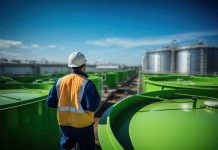It is becoming increasingly difficult for sceptics to argue against not only the existence of climate change and global warming, but also, its impact on our lives.
For example, in 1980, there were a little over 200 natural disaster events worldwide, whereas in 2020, that figure had risen to over 800. $4.5 trillion in damages were accumulated via floods and storms, which made up 70% of natural disasters. On top of this, the simple fact that 2010-2020 was the hottest decade on record makes the concerns of global warming and climate change even more difficult to ignore. You will struggle to find any operations which have not been affected in some way by changes in the climate in recent years. We are left thinking, what is the impact on process safety?
The Impact of Climate on Process Safety in the UK
The UK is not known for its extreme conditions, which is particularly welcomed by businesses operating with chemicals and other potentially hazardous substances. For instance, kerosene has a flashpoint (the lowest liquid temperature at which, under certain standardized conditions, a liquid gives off vapours in a quantity to be capable of forming an ignitable vapour/air mixture) of 38 degrees Celsius, meaning at any level under this temperature, kerosene will not release vapours in a way that it will be a flammable concern. With the tame climates we are accustomed to in the UK, the 38 degree flash point is typically not a concern for those handling the fuel, but the key issue here is that recently, due to the heatwaves we have experienced, local ambient temperatures have exceeded 38 degrees, so sites with small tanks of kerosene could have had moments where the ambient temperature was high enough, for long enough, to heat up bulk quantities of kerosene to temperatures above the flash point. Subsequently, if it is spilled, a normally unexpected hazard (fire from ignition of the vapour) is now present. Because temperatures historically have not been high enough to create these risks, sites holding high flash point fluids such as kerosene are not set up to deal with this risk, which can then lead to further issues relating to Hazardous Area Classification and DSEAR, and in turn potential harm to the individuals working on sites.
It’s not only abnormally high temperatures that have caused issues in process safety. On the contrary, winter storms have led to freeze events occurring in some parts of the world. An example of this is the freeze in Texas in February 2021, which led to a major power crisis in the state. Many refineries and petrochemical facilities experienced equipment failures and process upsets due to the unprecedented cold weather, forcing several to stop operating, significantly hindering the refining and plastics manufacturing operations in the U.S. Facilities can implement specific winterisation or freeze protection practices to help reduce the risk of process upsets should an extreme freeze event occur. Though protective measures do exist, there is still a question mark over whether winterisation techniques are sufficient to cope with the higher frequency at which these extremes are occurring, or whether an alternative is required.
The Impact of Climate on Human Factors
Human factors is primarily concerned with understanding human capabilities, and then applying this knowledge to the design of equipment, tools, systems, and processes of work in order to provide working conditions which are safe and manageable. Working in high temperatures such as those experienced in the recent heatwaves could have adverse effects on performance as full concentration is difficult to achieve under extreme heat, making mistakes more likely. These conditions could also potentially lead to problems for workers such as heat stress. If temperatures reach levels where the wellbeing of workers may be compromised, changes must be made for operations to continue in a safe and ethical manner. This may include an increase in air conditioning or ventilation, or changing the processes which occur on site, which may not always be possible if a site is to carry out its primary functions.
With changes in climate such as increasing temperatures showing little signs of levelling off or reverting to levels we are used to; action must be taken to ensure industry responds with appropriate changes in considerations for process safety.
Rob Ritchie and Carolyn Nicholls
enquiries@ras.ltd.uk









